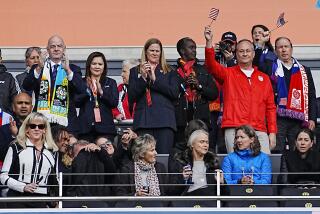Their Playing Field Is the Executive Suite
- Share via
The top-ranking woman in a USC study of the most influential sports business figures in Southern California never participated in competitive sports.
Ellen Oppenheim, general manager of the Los Angeles Department of Recreation and Parks, is among an emerging class of female executives bringing a business sense, rather than a competitive athletic background, to the male-dominated world of sports administration.
Oppenheim, 50, ranked fourth in the USC study, runs a city department with 2,000 full-time employees and 6,500 part-time employees. She oversees an annual operating budget of $120 million and a capital improvement budget of $200 million, the latter designed to maintain and expand facilities that already include two beaches, three archery ranges, seven camps, 14 golf courses, 58 pools, 175 community centers, 287 tennis courts and 15,500 acres of parkland.
As a student at the University of Wisconsin, Oppenheim led a recreation club that sponsored ski trips, sailing days and other outdoor adventures.
“I made friends and I stayed healthy, but I also learned about leadership,” she said. “I discovered as an undergraduate that I really liked organizing things.”
That discovery pointed her onto a career path. She worked for Stanford as an associate dean of students, for a private company that organizes conventions and trade shows, and for the city of San Jose in various capacities before accepting her current job in 1999.
Oppenheim’s story is the kind Becky Heidesch likes to tell. Heidesch, co-founder of the Huntington Beach-based Women in Sports Careers Foundation, said she receives calls from numerous women interested in translating business skills from careers as diverse as law and pharmaceutical sales into jobs in sports management.
The growing visibility of women’s sports in college, the Olympics and now in professional basketball and soccer leagues has spurred women to explore how to turn a passion into a career. In workshops and seminars, Heidesch reminds participants they need not be athletes to pursue that passion, pointing out that most sporting events require not only players and coaches but trainers, statisticians, ticket managers, marketing directors, facility managers and so on.
“Many women years ago went into physical education and coaching because that was the only way they could get into the field,” Heidesch said. “Now we see women from areas like marketing and technology bringing their business skills to their jobs and having an impact. There are tremendous opportunities for women to get involved in sports and do significant things through a variety of channels, channels they may not have even been aware of.”
More to Read
Go beyond the scoreboard
Get the latest on L.A.'s teams in the daily Sports Report newsletter.
You may occasionally receive promotional content from the Los Angeles Times.











